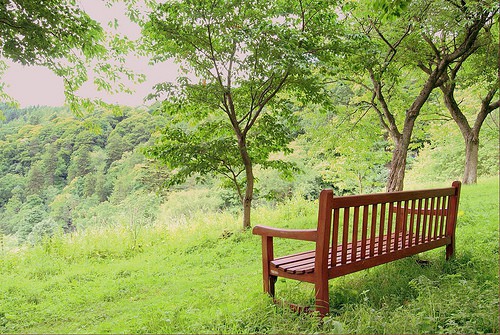
Editor’s Note: For the month of August, CSA will be taking sabbath hours for half the day every Friday. As we strive to incorporate the rhythms of rest into our work, we’ll be making space for sabbath here on our website as well.
Won’t you join us? Every Thursday, we will re-run an article on sabbath from our archives. On Fridays, we will leave a sabbath space for rest.
If you find this helpful or meaningful in your own quest for sabbath, we’d love to hear from you!
Why is it so difficult to make changes we know are good for us?
I think one of the reasons is that often we focus more on the symptoms of our problem rather than on the actual disease. We know we should pray more but don’t want to deal with the fact that our lack of prayer is a symptom of a life out of sync with God’s priorities. Or perhaps we resolve to spend more time working in Christian ministry, but in spite of our resolutions we just can’t find time in our busy schedules to get involved.
Several years ago I made a resolution that not only revolutionized my ability to prioritize my time but also helped me stick to the changes I made. I discovered the Sabbath. Sabbath is unique amongst life’s rhythms in that no such day existed until it appeared full-blown in the Hebrew Bible and it has no counterpart in the natural world. According to Albert Schweitzer, “If your soul has no Sunday it becomes an orphan.”
Sabbath is unique amongst life’s rhythms in that no such day existed until it appeared full-blown in the Hebrew Bible and it has no counterpart in the natural world.
Unfortunately, for many of us Sabbath observances are no more than a set of legalistic rules. During a recent visit to a small town in Iowa, a resident told us that all new houses in the area were being built with drains in the garage. Why? So that people could wash their cars inside on Sunday without the neighbors knowing! How tragic that this kind of thinking shapes the Sabbath day for many people. For others of us Sunday has gone from being a day of rigid restrictions to the only day of the week that provides the freedom to do almost anything we want. Our lives are too busy and our appetites too insatiable to permit us to consider “losing” a whole day that could otherwise be spent on work or shopping.
The Jewish philosopher Abraham Heschel saw the Sabbath day as a miracle. In his book The Sabbath, Heschel explains that Jewish philosophers puzzled for many years over Genesis 2:2, “On the seventh day God finished his work,” which implied to them that there was an act of creation on the seventh day, too. They came to the conclusion that what God created on the seventh day was Sabbath, a day of peace and tranquility when God and all of God’s creation rested in the enjoyment of life as God intended it to be. For Heschel, “The essence of the world to come is Sabbath eternal.”
The Jews yearned for a future in which Sabbath was not just a single day’s event but a way of life, seven days a week. The early Christians believed that God was beginning a new creation through the resurrection of Christ, meaning that the eternal world the Jews dreamed of was opened to them in the here and now. The Sabbath was the culmination and goal of their week, the day on which they celebrated not just their relationship with God but also the glimpses they had caught of God’s new world. They rested in the satisfaction of all they had accomplished that had glorified God over the preceding week.
Today, too, Sabbath is meant to be what theologian Paul Stevens calls, in Seven Days of Faith, “a delicious relaxation in God,” a day on which we glimpse the joy, tranquility, peace, and abundance of life in eternity. It is a day that is meant to realign our whole life. It reaffirms our relationship to God, to the rest of humankind, and even to God’s creation. The rest of the week should be focused on activities that enable us to look forward to the Sabbath—not in some perfunctory “Oh, I wish it were Sunday” fashion, but rather the whole of the week is meant to focus on making the joy, peace, and abundant provision of the Sabbath possible not only for us but for all of God’s creatures as well.
First, we celebrate the joy of our restored fellowship with God. My husband Tom and I spend time journaling on Sunday morning, then check in with each other to see how well we have focused on God’s priorities during the preceding week. During this time I love to spend a few minutes thinking about how I have drawn closer to God over the last week. I also like to remind myself of how I have helped others draw closer to God. The challenging part is looking ahead and asking myself, “How in this coming week can I improve my relationship with God?” Of course, the restoration of our fellowship with God is not something we can fully celebrate as isolated individuals. It is only as we come together in a worshipping community that we can fully appreciate and enter into the joy of our restored relationship to God.
Second, the Sabbath is a day to celebrate relationships—and not just with friends and family. This is a day for delighting in our inclusion in that great international community that is Christ’s body. We are all part of the same human family. As we go to church and interact with people, we should savor the rich diversity of that family and the wonder and joy of sharing life with brothers and sisters from around the world. Particularly as we share the bread and wine of communion, we sense that we not only come together with brothers and sisters from around the world but also with all those who have gone before us. In the process we become aware of those for whom the Sabbath rest is still little more than a dream: the destitute, the abandoned, and the neglected.
One question I often ask myself at this time is, “What have I done in the last week that bears the fingerprints of God?” It helps me to rejoice in the ways God has used my gifts and talents in the last week to bring glimpses of God’s eternal world into the lives of others.
I am amazed at the peace and satisfaction this simple question has brought to my life. It is easy for me to get caught up in the needs of the world around me. Sometimes I feel overwhelmed by the never-ending parade of pain and suffering in our world. I want to get out and use every moment to heal the sick, feed the hungry, and preach good news to the poor. Unless I take time to remind myself of the good things I have accomplished, I soon find my days becoming busier and busier as I unrealistically try to take responsibility for the problems of everyone I meet. In the process my time with God and my enjoyment of the abundant life God wants for me get pushed further and further to the margins.
Third, the Sabbath is a day to celebrate the glorious world that God has provided for us to live in. This is a great day to go for a hike or a drive in the country or to get out into the garden. I love to spend a few moments imagining that our Creator is walking in the garden, too, enjoying with me the beauty of all I see.
Imagine how our priorities and our New Year’s resolutions would change if we had this perspective. No wonder Jesus healed on the Sabbath and criticized the legalisms and restrictive rules the Pharisees inflicted on the people that robbed them of their joy and freedom. He wasn’t downplaying the importance of Sabbath as a holy day, but was bringing the Jews back to God’s perspective. In the process he gave them breathtaking glimpses of the eternal world in which all will one day be made whole.
Jesus wasn’t downplaying the importance of Sabbath as a holy day, but was bringing the Jews back to God’s perspective.
In a 24/7 world with no space for rest we must purchase our freedom from work and busyness with some hard choices. How could you more authentically practice a Sabbath day? Perhaps you would like to start as one friend of ours recently did, by instituting a “technology Sabbath.” One day a week he disconnects from his phone and the computer. It has done much to decrease the stress in his hectic life and has made it easier for him to enter into the joy of God’s presence. What choices should you make that will enable you to take at least part of Sunday (or whichever day in the week is most suitable for you) to face in a different direction—towards God and the peace and tranquility of God’s eternal world?
Christine Sine is the author of Sacred Rhythms: Finding a Peaceful Pace in a Hectic World.


